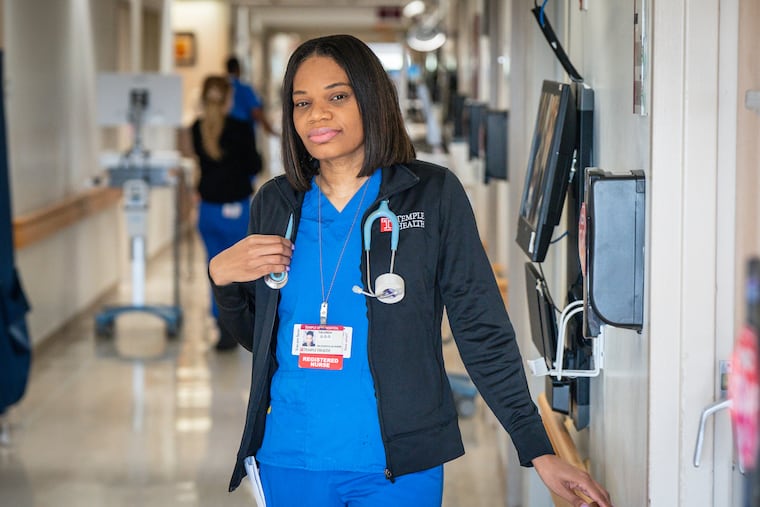‘If you need something, just call.’ Registered nurses are the go-to person for hospitalized patients.
In 12-hour shifts at Temple University Hospital, Yalonda Fowler often takes care of five patients.

My Philly Hospital Job is a short series that brings Inquirer readers inside hospitals to learn more about the day-to-day lives of health-care workers.
Yalonda Fowler, 40
Job
Registered nurse at Temple University Hospital
» READ MORE: We want to hear your thoughts about this and other health-related articles. Please fill out our Eds and Meds survey.
What to know about the job
Registered nurses are the lifeblood of hospitals. They assess patients, administer physicians’ orders, and are the first to arrive when a patient calls for help.
There are more than 3 million registered nurses employed nationwide and nearly a third work in hospitals, according to the U.S. Bureau of Labor Statistics. The Philadelphia metro area has 70,000 working registered nurses, the fifth-highest in the nation. The average annual pay for registered nurses in the region is $87,830.
On the job
Muffled television banter previewing the next Eagles game drifts from a patient’s room into the hallway of Temple University Hospital’s 7 East unit. That’s the only sound in a usually bustling general hospitalization unit, but Yalonda Fowler doesn’t dare say it’s quiet.
“We don’t say the ‘Q’ word,” the registered nurse says with a frown to a colleague who comments about the relative slow pace of the morning. It’s bad luck, she explains, heading toward a patient’s room.
In a room down the hallway, Roscoe Knight waits for his breakfast. Knight, a cardiac patient in his 60s, came in overnight because his heart was pumping blood too slowly. Fowler performs a routine morning exam: She checks his pulse in all limbs, tests his arm strength, and presses to feel whether his abdomen is stiff.
Knight can’t move his left arm, as a result of a past stroke. That makes it hard for him to sit up, so when it’s time for Fowler to listen to his lungs, she calls to a second nurse to help. Fowler and her colleagues must hold him, safely, while examining him.
Nursing is a physical job. In a span of a couple hours, Fowler walks up and down the hallway between patient rooms and the nurses station several dozen times. On one of those trips, she brings back Knight’s medications.
“You allergic to anything that you know of?” Fowler asks.
“Just needles,” Knight jokes, lifting his arm to show his IV line and the Band-Aids covering failed attempts to secure it.
“Me, too,” Fowler responds with a smile and hands him the pills.
She usually takes care of four or five patients during her 12-hour shifts. But today Knight is one of only two under her charge. Eliana Steinman, a new nurse in the unit who graduated from the Community College of Philadelphia in the spring, is in charge of two others. Fowler, with her 18 years of experience, is there to mentor her and answer questions.
Midmorning, Fowler checks in with Steinman to see how she’s faring with her two patients. The trainee says the week before, on another unit, they had her take care of four patients.
“You came prepared!” Fowler exclaims.
After checking on another patient, and typing a few notes in a work station, Fowler returns to Knight’s room, where breakfast has arrived. She makes sure that he knows where to find his call button, which beeps in the nurses’ station when clicked.
“If you need something, just call,” Fowler tell him. “I’ll be here all day.”
Between bites of muffin, Knight smiles. “Good.”